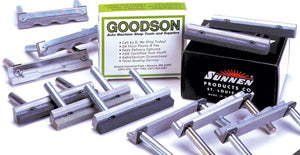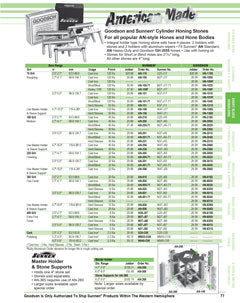We talked last time about honing oils and their importance in the honing process. Today we’re going to look at honing stones and how they affect the final product.
 Before we get too far though, I’d like to extend a big thank you to Sunnen Manufacturing for the information included in “Sunnen’s Complete Cylinder Head and Engine Rebuilding Handbook” by John G. Edwards. This book is no longer in print, but you might still be able to find a used copy out on the web somewhere. We’ll also list some other resources at the end of the post if you want to dig deeper.
Before we get too far though, I’d like to extend a big thank you to Sunnen Manufacturing for the information included in “Sunnen’s Complete Cylinder Head and Engine Rebuilding Handbook” by John G. Edwards. This book is no longer in print, but you might still be able to find a used copy out on the web somewhere. We’ll also list some other resources at the end of the post if you want to dig deeper.
“The best stone for the job is one hard (strong) enough to hold each abrasive grit in place just long enough to wear down its sharp cutting edge and then allow that dulled grit to drop out, permitting the sharp grit underneath to take its place.” — Sunnen’s Complete Cylinder Head and Engine Rebuilding Handbook, page 271
Abrasive & Bond
Let’s take a look at how honing stone abrasives are categorized first.
- Conventional Abrasives v. Super-Abrasives
Conventional Abrasives are the traditional abrasives such as aluminum-oxide and silicon-carbide. Aluminum-Oxide (AO) is best suited for stock removal in steel while Silicon-Carbide (SC) works best for cast-iron, bronze, brass and aluminum. It’s also used frequently for non-metallic materials. Super-Abrasives include abrasives such as CBN and diamond. - Vitrified, Resin and Metal Bond
Vitrified Bond is the most commonly used bond for conventional abrasives. It is a type of clay mixed with the abrasive, then fired in a furnace to make a glass-like consistency. Resin Bond is generally a plastic bonding material, though shellac was used in the past. Resin bonded abrasives are generally limited to very fine polishing. Metal Bonds can be brass, steel, nickel or carbide based. They are designed so as the abrasive grains wear they break out and expose new grain.
Material & Hardness
An important consideration when choosing a honing stone is the material you will be honing. You’ll need to know the hardness and the composition of the material to be honed in order to choose the correct abrasive.
 As we said before Aluminum-Oxide is best suited for steel. It is also used when honing Nicasil since Silicon-Carbide is a part of the material and abrasives won’t cut materials of similar density and composition.
As we said before Aluminum-Oxide is best suited for steel. It is also used when honing Nicasil since Silicon-Carbide is a part of the material and abrasives won’t cut materials of similar density and composition.
Silicon-Carbide abrasive is effective for cast-iron, bronze, brass and aluminum. This is why you’ll find most of the honing stones in the Goodson catalog to be silicon-carbide.
When it comes to grit you may need to experiment to determine which will be the best for a particular application. What works for one application may not work for another.
We’ve talked before about grits and I’m pretty sure everyone understands that the higher number the finer the grit and the finer the grit the smoother the surface. Grit sizes are determined by the number of particles that will pass through a screen mesh. A 220 grit abrasive means that 220 particles will pass through a screen with 220 horizontal and vertical wires in one square inch. The definition is a little clunky, but you get the idea.
We could go on for a while on this topic, as this barely scratches the surface, but it’s enough for this article. For more information, check out these related articles:
- The Smooth Science of Cylinder Honing, Engine Builder Magazine
- Cylinder Bore Refinishing with Honing Tools, Engine Builder Magazine
- Tips for Honing Nicasil, Goodson Gazette Blog
As always, if you have any questions about selecting a honing stone or any other technical topic, contact the Goodson Tech Services Department by phone (1-800-533-8010) or email.


 Selecting the right honing stone for the material being worked should be relatively easy. Though when you look at the Goodson catalog it can seem a bit overwhelming since we do have over 150 different honing stones listed just for cylinder honing. Add in rod honing, align honing, lifter bore honing and valve guide honing stones and you’ve got quite the assortment to choose from.
Selecting the right honing stone for the material being worked should be relatively easy. Though when you look at the Goodson catalog it can seem a bit overwhelming since we do have over 150 different honing stones listed just for cylinder honing. Add in rod honing, align honing, lifter bore honing and valve guide honing stones and you’ve got quite the assortment to choose from.